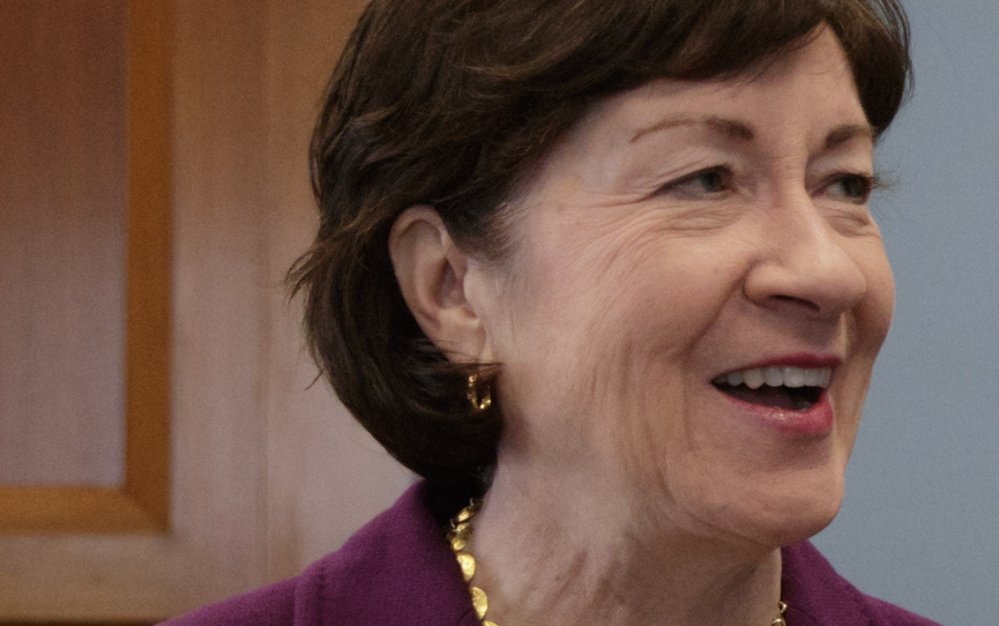As the House Intelligence Committee’s investigation of Russian interference in last year’s presidential election collapsed last week, Maine’s two U.S. senators expressed renewed confidence that a committee they both serve on will conduct a credible and comprehensive investigation.
Republican Susan Collins and independent Angus King both say they and their colleagues on the Senate Intelligence Committee are committed to a thorough investigation of Russia’s activities, including any ties between Moscow and President Trump’s family, close associates and campaign aides, and that convening a special committee or appointing a special prosecutor was unnecessary.
“We’re going to follow the evidence wherever that may lead – I’m absolutely confident of that,” Collins reiterated Thursday on MSNBC’s “Morning Joe” program. “And we are going to ask the kinds of tough, probing questions that need to be asked not only for the sake of our democracy but to assure the American people that we have gotten to the bottom of this.”
King, a former two-term governor of Maine who caucuses with the Democrats, appeared on the same broadcast alongside a Republican colleague on the committee, Sen. James Lankford of Oklahoma, in a show of solidarity.
“We’re going to try to avoid some of the infighting that you’re seeing on the other side” in the House, King said, in remarks later echoed by Lankford.
After the appearance, Lankford tweeted a photo of the two taking a selfie together. “Honored to serve on the Senate Intel Cmte w/this guy!” he wrote of King, followed by the hashtag “#bipartisanship.” King retweeted it, saying in return, “Thank you for your hard work on behalf of the American people.”
WORKING TO DRAW CONTRASTS
The senators’ appearances were part of a conscious effort last week by members of the Senate Intelligence Committee to demonstrate a bipartisan cooperation and resolve on the investigation, in contrast to what critics view as the naked partisanship of the House Intelligence Committee and its chairman, Rep. Devin Nunes, R-Calif.
Nunes, an early supporter of Trump’s presidential bid, is under fire for a late-night trip to the White House to brief Trump officials on the investigation and to view intelligence documents they provided that he subsequently refused to share with his committee colleagues. Nunes and his House colleagues have focused their investigation on finding who was leaking information about Trump aides’ contacts with Russian officials, rather than the revelations the leaks contained, or the fact the FBI found the situation troubling enough to launch an investigation, which is ongoing. The ranking Democrat on the House committee, Rep. Adam Schiff of California, on Monday called for Nunes to recuse himself from the proceedings.
As in the House, Republicans are a majority in the Senate and have eight of the 15 seats on the Senate Intelligence Committee and the chairmanship, held by Sen. Richard Burr of North Carolina, but its members are working to convince the public that they will put partisanship aside.
On Wednesday, Burr and the committee’s vice chairman, Sen. Mark Warner, D-Va., held a joint news conference to brief the media on their progress.
“We’ve known each other for a long time. We’re social friends,” Warner said of Burr in a television appearance Friday with PBS’s Charlie Rose when asked why the committee was holding together.
Collins agrees. “This really has been a nonpartisan investigation, not just a bipartisan investigation,” she said Thursday on “Morning Joe.”
“Many of us have forged personal relationships with Democrats with whom we work on our committees,” she added, “and we’ve learned the simple truth that if you want to get things done in the Senate, it usually requires 60 votes.” The Republicans have a slim 52-48 majority in the chamber.
SKEPTICAL OF INDEPENDENT PANEL
The Senate committee has not been without its problems. Like Nunes, Burr has had friendly relations with Trump, serving as a member of his transition team and last month agreeing to a White House request to call reporters to sow doubt about media reports on contacts between the Trump campaign and Russian officials. When Burr’s actions became public in late February, Warner, King and Collins all criticized his actions.
“This committee must have credibility not only with our colleagues, but also with the American people – to whom we owe nothing less than a thorough, fair and nonpartisan investigation – and I will have serious concerns if it seems that we are no longer able to proceed in this matter,” King said in a statement to the Portland Press Herald at the time.
Throughout the controversy, both Maine senators have resisted calls for the formation of an independent committee or the appointment of an outside commission to take over the congressional investigations – a position held by Schiff, Democratic Rep. Chellie Pingree of Maine’s 1st District, and Republican Sen. John McCain of Arizona.
King reiterated his position Thursday, telling CNN’s Anderson Cooper that another Senate committee “wouldn’t be materially different than the committee that you have today,” which was well-balanced and committed to impartiality. His panel’s staff has the requisite security clearances and is already at work.
“You’d have to start all over with security clearances for the staff and the members of the commission,” King said. “It would be six to eight months before such a group got to where we are today.” He said on “Morning Joe” that the Senate Intelligence Committee’s own investigation would likely take six to eight months.
Collins told The New York Times that the drama on the House Intelligence Committee hasn’t helped their work. “I worry that the chaos on the House side has affected the public’s view on whether Congress can credibly investigate this matter,” she said. “I believe the answer to that is still yes, and that the Senate is the place.”
Colin Woodard can be contacted at 791-6317 or at:
cwoodard@pressherald.com
Send questions/comments to the editors.



